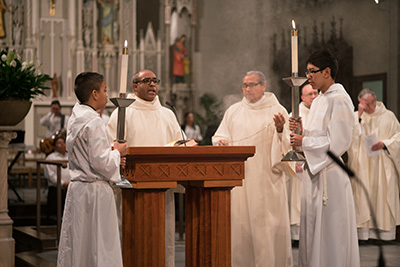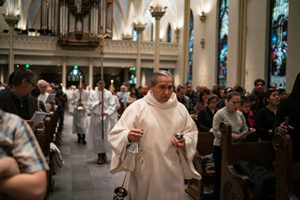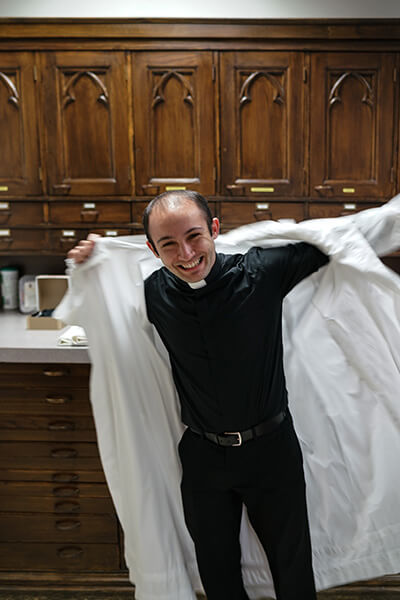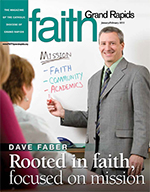
By Zulema Moret | Photography by Luis Fonseca
The word “deacon” comes from the Greek and means “servant”. The deacon is an essential and constituent element of the Church; his mission stems directly from Christ and what the deacon does is based on the action of the Holy Spirit. Therefore, he is a leader in the local Christian community (the diocese) at the service of God and his brothers; a servant of everyone. Likewise, the deacon is an intermediary between the bishop (and the priest) and the rest of the people of God, an interpreter of the needs and desires of the Christian communities (Ad Pascendum – Paul VI). The deacon is ordained forever by the Bishop by the laying on of hands; as a minister of and for the particular Church, he is a member of the ordained ministry and as such receives a special grace to carry out his ministry.
The functions of deacons

Among the numerous functions of deacons, we find those of: proclaiming the Gospel, preaching and assisting at the altar; administrating the sacrament of baptism, presiding over the sacrament of matrimony; conferring sacramentals (such as blessings, holy water, etc.); bringing Viaticum (the sacrament of the Eucharist when it is administered to the sick who are in danger of death) however, the deacon cannot administer the sacrament of anointing of the sick. Furthermore, and always in accord with the determination of the hierarchy, he may direct the administration of a parish; he may be placed in charge of a deaconry; may preside at a Sunday celebration, though he may not consecrate the Eucharist (which only corresponds to priests and bishops). He may also perform other services, according to the specific needs of the diocese, particularly all that is related with the works of charity and the encouragement of the communities.
Permanent Deacons
The permanent diaconate was newly reestablished during the Second Vatican Council. This type of diaconate can be conferred upon married men. The permanent deacon must be considered a “righteous” man in the community, charitable, respectful, merciful and helpful. It is the determination of the bishop that he be already married, and in this case, that his wife must give written authorization to the bishop of her acceptance of the ordination of her husband (an indispensable prerequisite).
We have had the opportunity to interview two of the permanent deacons in our Diocese along with their wives. We first spoke with Deacon Carlos Gutiérrez, originally from the Dominican Republic and consecrated a permanent deacon on May 5th, now celebrating sixteen years in the permanent diaconate and serving in the parishes of Holy Name of Jesus and Saint Joseph the Worker. The first call came from the pastor of the parish where he served in the Diocese of Paterson in New Jersey. Deacon Carlos listened to the call he received, though at first, he thought “that I was not worthy”, but Fr. Hernán Arias told him that “God will give you the grace” and so it was, because with the unconditional support of his wife Victoria he embarked on the path to the diaconate. His wife says that from the beginning she has prayed for her husband because this is a ministry for both of them. Among the current challenges that Deacon Carlos shares with us, he mentions that he “feels helpless against the needs of the community, for example, in terms of the grave situation of the immigrants”, while adding, “I live with great satisfaction walking alongside the people, and the love that I receive from my community”.
We then were able to speak with permanent deacon Martín Zapata, who was born in Brownsville, Texas, on January 23, 1944. For Deacon Martín, a great inspiration and motivation in his decision to become a deacon was “feeling the love and forgiveness of God and that of my wife Josi in our marriage and seeing men of faith being formed and being ordained in the Cathedral of Saint Andrew”. For Deacon Martín, being a deacon implies “serving God and my community in the mass, visiting the sick, families, funerals and much more”. He feels that there are challenges for the Catholic Church in the future and mentions that among them are that “fathers and mothers grow in study, prayer and meditation and pass on to their children this faith”. On the other hand, his wife Josefa Zapata (Josi) says that “accompanying my husband has been a blessing for both of us” and “I accompany his ministry with patience and understanding.”
New Aspirants to the Diaconate
After some years of interruption, the Diaconate Program was restarted in the Diocese of Grand Rapids for aspirants of diverse Catholic communities (Anglos, Hispanics, Asians). We visited the school where part of the on-site classes are carried out and had occasion to speak with the aspirants of the Hispanic community and their spouses. For José Santos Pérez, his desire to “know the Sacred Scriptures, seeing how Jesus loves his people and knowing that He loves me just as I am has prompted me to become a part of his vineyard”. In addition, discussing challenges and desires, Carlos Curiel expresses his desire to “offer my help to the community, contribute my potential first and foremost to my Catholic community”. Reminding us of mission and grace, Donato Pérez says: “It is a great blessing to be a part of this group, I am grateful to God to be in this process and I hope in God to accomplish the objective of becoming a deacon to give the best of my life to God and to my people.”
Since their wives accompany them on this journey of formation and commitment, we have asked them to offer a phrase or word that they would identify with the process. For Modesta this journey is: “learning, spirituality and service”; for María “meeting needs”, for Melisa, “serving the needs of the community”. For all of them, this process has been “a blessing.”
For the aspirants, this will be a time of study, learning, and experiencing a change in the direction of their lives, and at the same time a call to obedience to the Bishop, the pastor and the community of faith. Without a doubt, an array of great challenges they will master little by little with the grace of God.



